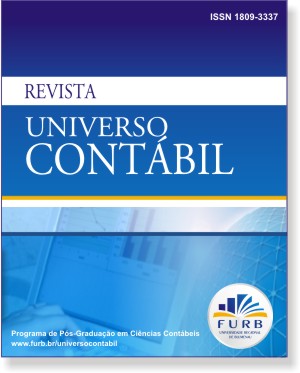DIREITO DESPORTIVO RESULTANTE DA FORMAÇÃO: EVIDÊNCIA EMPÍRICA NOS CLUBES PORTUGUESES E BRASILEIROS
DOI:
https://doi.org/10.4270/ruc.20117Palavras-chave:
Valorização fiável. Activo intangível. Jogador formado internamente.Resumo
Nas empresas desportivas o principal item intangível é o direito desportivo sobre o jogador. Investigações mostraram que nos clubes europeus o direito desportivo sobre o atleta formado internamente geralmente não é reconhecido como activo no Balanço, ao contrário do direito relativo ao jogador adquirido de terceiros. No Brasil, a prática contabilística é diferente, fruto da Resolução n.º 1005/2004, do CFC. Perante estas diferenças, o estudo debruça-se em particular sobre o tratamento contabilístico do direito desportivo resultante da formação, num espaço geográfico reduzido a Portugal e Brasil. Como objectivos desta investigação definimos os seguintes: a) verificar se o direito desportivo sobre o jogador preenche os requisitos necessários para ser reconhecido como activo intangível; b) identificar as semelhanças e diferenças nas práticas contabilísticas entre os clubes portugueses e os clubes brasileiros no que respeita aos direitos desportivos resultantes da formação; c) dissecar as razões dos clubes para a valorização, ou não valorização, do direito desportivo resultante da formação. Propomo-nos alcançar estes dois últimos objectivos através de evidência empírica como resultado de um inquérito por questionário. Concluímos que tanto o jogador formado internamente como aquele cujo direito desportivo é adquirido de terceiros cumprem com os requisitos necessários para serem reconhecidos como activo intangível. Em Portugal, a quase totalidade dos clubes não reconhece o direito desportivo resultante da formação, porque consideram que não existe um critério fiável para a valorização desse direito. Contrariamente, a totalidade dos clubes brasileiros reconhecem esse direito como activo intangível.
Downloads
Downloads
Publicado
Como Citar
Edição
Seção
Licença
Os direitos autorais para artigos publicados nesta revista são do autor, com direitos de primeira publicação para a revista. Em virtude de aparecerem nesta revista de acesso público, os artigos são de uso gratuito, com atribuições próprias, em aplicações educacionais e não-comerciais. A revista permitirá o uso dos trabalhos publicados para fins não-comerciais, incluindo direito de enviar o trabalho para bases de dados de acesso público. Os artigos publicados são de total e exclusiva responsabilidade dos autores.
• O(s) autor(es) autoriza(m) a publicação do artigo na revista;
• O(s) autor(es) garante(m) que a contribuição é original e inédita e que não está em processo de avaliação em outra(s) revista(s);
• A revista não se responsabiliza pelas opiniões, ideias e conceitos emitidos nos textos, por serem de inteira responsabilidade de seu(s) autor(es);
• É reservado aos editores o direito de proceder ajustes textuais e de adequação do artigo às normas da publicação;
• O(s) autor(es) declaram que o artigo não possui conflitos de interesse.


